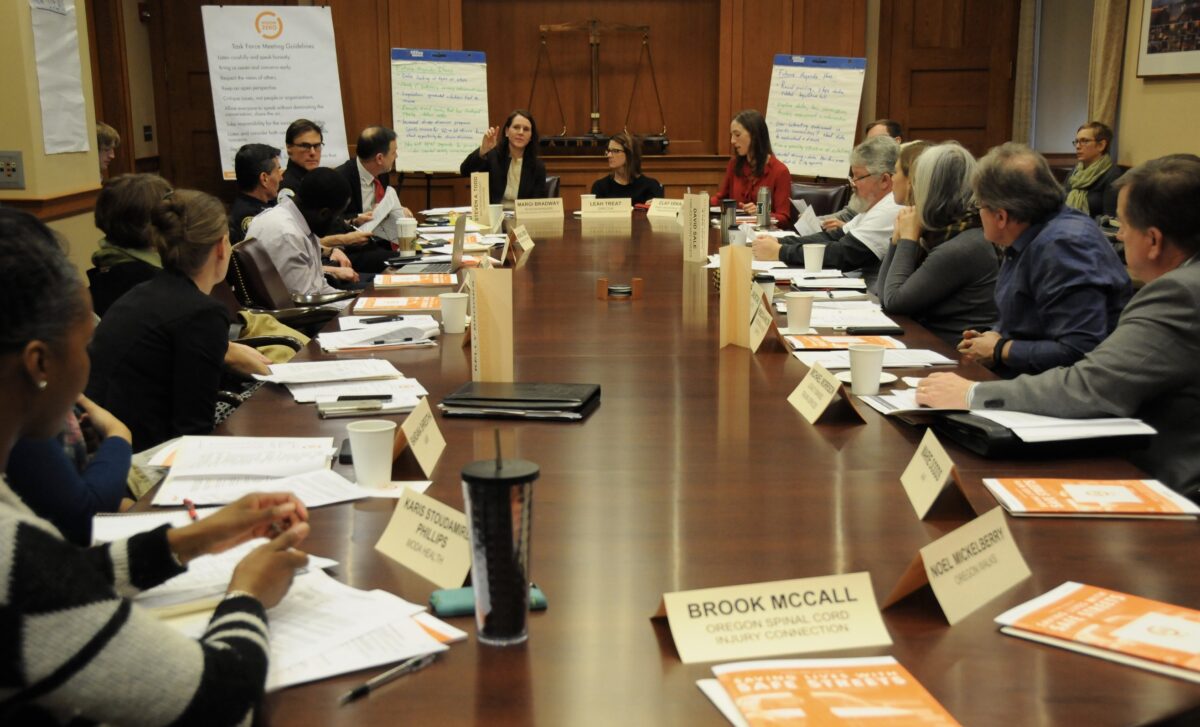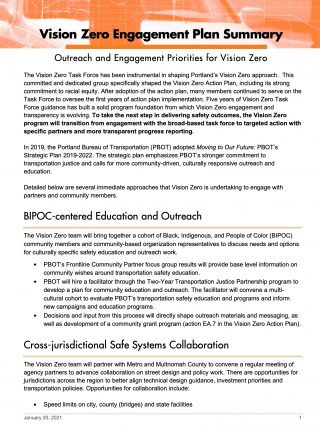
(Photo: Jonathan Maus/BikePortland)
The advisory group that helped implement Portland’s Vision Zero Action Plan has been disbanded.
“As our work has evolved, so too must our Vision Zero engagement.”
— Chris Warner, PBOT Director
With just four years to reach the 2025 target of zero road deaths, the Portland Bureau of Transportation has officially dissolved the Vision Zero Task Force and plans to shift to a, “model of community accountability that engages an even broader set of stakeholders.”
This move was confirmed in a letter to Task Force members, but was not announced publicly until now. A Vision Zero newsletter emailed on February 4th made no mention of the change.
In a letter (PDF) dated January 22nd, PBOT Director Chris Warner offered gratitude to task force members. “Your leadership and commitment to safe streets have contributed to a strong foundation for PBOT’s Vision Zero work,” he wrote. “The Vision Zero Task Force has shaped Portland’s Vision Zero Action Plan, embedded racial equity and elevated street design in our work, and overseen implementation of Vision Zero actions over the past four years.”
Portland adopted its Vision Zero resolution in June 2015 and passed an action plan six months later. The Task Force was charged with implementing that plan. They met 11 times between February 2017 and October 2019.
PBOT, Portland, and vision zero in general have gone through massive shifts in recents years. The agency has gone through political and staffing leadership changes, Portland has been at the center of a reckoning on racism and policing, and traffic safety advocacy has evolved to be more aware of how road projects and policy decisions impact all users.
Advertisement

In his letter, Warner wrote that PBOT’s community engagement style will change to fit the times. The task force will be replaced by a new, four-step public engagement plan that will, “continue to support our work to build a culturally-responsive and community-driven Vision Zero education program.”
According to the Vision Zero Engagement Plan Summary (PDF), the four new focus areas will be: “BIPOC-centered education and outreach”, collaboration with Metro and Multnomah County, an outreach and marketing plan for automated enforcement, and a new informational dashboard to help inform the public on progress.
PBOT’s Vision Zero staff will create a cohort of Black, Indigenous, and people of color to be called the “Frontline Community Partner focus group” which will “provide base level information on community wishes around transportation safety education” and help develop marketing efforts. The group will also audit PBOT’s existing safety programs. A facilitator will be hired to create an outreach and education plan.
The City of Portland will also convene a regular meeting of partners from Metro and Multnomah County to “advance collaboration on street design and policy work.” They plan to focus on issues like speed limits, regional safety messaging and education, and legislation.
With PBOT currently working to expand automated enforcement, another focus will be to seek feedback and better educate the public about this important tool.
A new online dashboard will be updated quarterly, is expected to be live early this year, and is intended to, “provide clear, easy-to-access updates on street safety actions and programs.” It will include data on things like street lighting, crashes, project progress and evaluations, enforcement camera data, traffic citation data, and so on.
These changes come as Portland reels under the consequences and constant threat of increasingly violent streets. Far from seeing substantial progress for six years of Vision Zero efforts, PBOT is trying to right the ship. Time will tell if this new tack will result in smoother sailing.
— Jonathan Maus: (503) 706-8804, @jonathan_maus on Twitter and jonathan@bikeportland.org
— Get our headlines delivered to your inbox.
— Support this independent community media outlet with a one-time contribution or monthly subscription.

